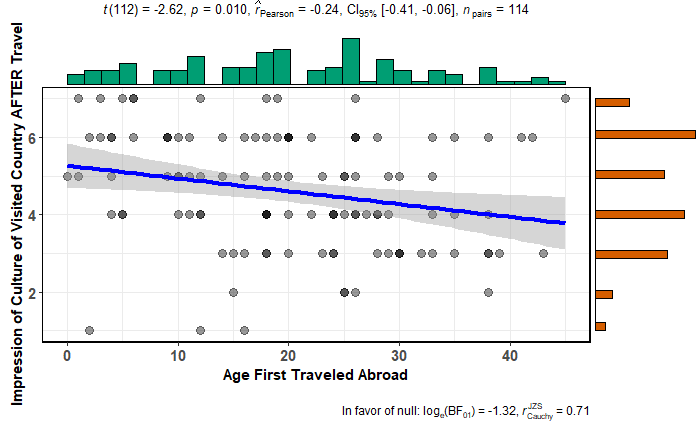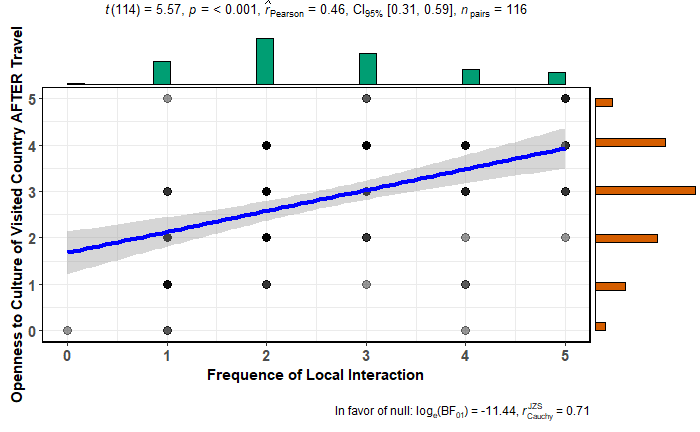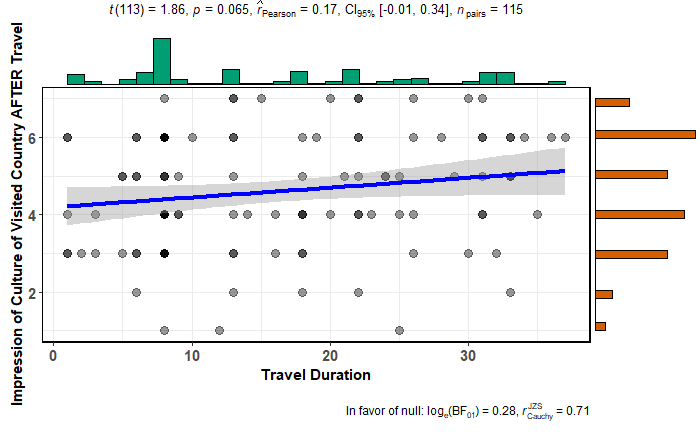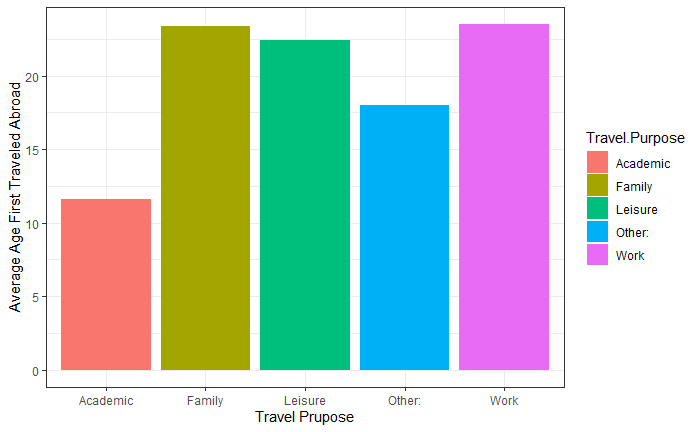Abstract. This study focuses on researching the relationship between travelling and travelers’ openness and impression toward the local culture afterwards. The relationship was measured through a survey evaluating participants' background and travelling experiences. A conclusion was drawn from the survey that travelers’ travelling at a younger age, longer duration, and had more interactions with locals have a higher openness and a more positive impression of the travelled country.
Introduction
Starting in the 18th century as transportation and communication have advanced, integration among cultures and races has quickly accelerated. Immigrants migrated along with their culture, identity, and language, which naturally clashed with the receiving society [1]. The process of globalization resulted in more convenient travel and allowed citizens to experience new cultures like never before. The growing consciousness of the differences between one’s culture and others’ naturally accompanies different reactions based on several traits. As one of the Five-Factor personality traits, openness to new experiences has great potential in helping researchers understand how people interact with other cultures. Therefore, there is an interest in discovering more relationships between one’s openness and their foreign experiences. Although there is well-documented literature on this relationship, there was scant research investigating age, purpose, and frequency of interaction with the locals. Therefore, this study looked to investigate these relationships between the different travelling experience effect on travelers’ impression and openness toward the culture.
Literature review
Openness to experience reflects people’s tendency to be curious, creative, aesthetically sensitive, and their preference for diversity [2]. David J. Sparkman et al, tested whether multicultural experiences reduce prejudice by increasing Openness to Experience [3]. The first study measured participants’ foreign travel frequency, their amount of contact with members of different countries, and their attitude toward five different ethnic groups using a feeling thermometer. They found that multicultural experiences were associated with greater openness and less prejudice toward different cultures. Furthermore, increased contact with cultural members and experience with cultural elements both increased openness and reduced racial prejudice in the study.
In Study 2 of the same article, 110 undergraduate students were shown a slideshow depicting local or multicultural environments and asked to summarize their thoughts and reactions to the pictures. This study found that participants who were shown pictures of foreign cultures reported being higher in Openness to Experience and expressed less prejudice toward these cultural groups. Specifically, the relationship between multicultural experience and primary outgroup prejudice was significant as the application of multicultural experience yielded a reduction in primary outgroup prejudice. Overall, their findings suggest that exposure to pictures of multiculturalism results in higher Openness to Experience.
In another study by Boris Forthmanna et al, the relationship between multicultural experiences and Divergent Thinking was examined [4]. The relationship was tested using the 8-item Multicultural Experience Survey where participants indicate their time spent in a foreign country, their language ability, family history with foreign cultures, and the extent of exposure to foreign cultures. In their sample of 199 participants, researchers found that openness to experience and multicultural experiences were significantly related, but not to fluency and flexibility. Participants were also presented with DT (Divergent Thinking) tasks in which they were asked to think of as many uses of a certain object in 2 minutes. Their responses were found that a strong DT also correlated with fluency, flexibility, and creative quality.
In conclusion, the overall trend of multiple studies investigating traveling and multicultural experiences showed an increase in Openness to Experience, Divergent Thinking, Agreeableness, and Emotional Stability relative to those who did not travel. The trend also reveals that exposure to multiculturalism leads to a direct reduction in prejudice. Going on vacation may receive cultural shocks which are mentally rewarding and more empathetic [5]. However, participants high in openness are more receptive to new ideas from foreign cultures, whereas people low in openness could be shocked by those ideas.
Through the previous reviews, there is scant study on how the factors of participant’s experience during travelling affect their afterward impression. Inspired by these studies and to find out more in the area of migration and multiculturalism, this study researches how traveling abroad impacts one’s impression and openness to the local culture. The hypothesis is that if travelers interacted more with the locals, traveled at a younger age, and traveled for a longer duration, they are more likely to have a positive impression of the country and higher openness toward the culture of the country.
Method
A survey was made based on the hypothesis. It examines the participants’ travel length, interactions with locals, purpose of traveling, impression of the culture, openness to the culture, Big Five personality traits, and age first traveled. 270 participants took part in the survey. Of these participants, 91 did not finish and were filtered out. Of these 179, only 114 participants were kept due to having complete or mostly complete data. All participants kept for analysis had an experience of travelling abroad. Of the 114 participants, they have an average age of 31.5. Final analyses were run with these participants.
Procedure. First, the participants clicked on the link that took them to Qualtrics to answer a series of questions. They were first asked whether or not they had traveled abroad and this question would determine if they could take the survey. If they answered yes to the previous question, participants can proceed to answer how proficient they are at English and how many times they have traveled to another country. On the second page, participants were asked about their age and the age when they first traveled abroad. The third page investigated the cultural background of the participants by asking the parents’ nationality and participants’ extent of exposure to foreign cultures. Afterward, they answered the duration of travel and the purpose of travel. On the next page, participants were asked to rate their frequency of interactions with local people, openness to the visiting culture before and after, and impressions of the culture before and after. Lastly, they were asked to rate how well 10 pairs of personality traits fit them. Participants then click the finished button which stores their responses and thanked their time.
Results
From the survey, data was collected of 270 participants’ travel length, interactions with locals, purpose of traveling, impression of the culture, openness to the culture, Big Five personality traits, and age first traveled. Using software R, the data of 114 participants were compared between openness and impression to their frequency of interaction with locals, age first travelled, and duration of stay.

Figure 1: Impression of Culture Visited vs Age First Traveled Abroad
To test the hypotheses, several correlation tests were run. First, the relationship between age when first traveled abroad and the impression of culture visited to investigate if traveling at a younger age resulted in a more positive impression of the country was tested. The correlation test revealed a strong significant correlation between the age participants first traveled abroad, and participants’ impression of the culture in the visited country, t (112) = -2.62, r= -0.24, p = 0.02 (Figure 1). These results confirm that the younger a participant first traveled to a country, the more likely they were to have a positive impression of the country after travel.

Figure 2: Openness to Culture Visited vs Frequence of Local Interaction
Second, the relationship between openness to the local culture and frequency of local interactions to find out whether more interactions with the locals bring a more positive impression to the participants was tested. The relationship between frequency of local interaction and openness to new culture supports the hypothesis, t (114) = 5.57, r= 0.46, p= <0.001. The more frequent participants interacted with locals, the more likely that they are open to the cultures of the locals. On the other hand, if participants did not interact with locals as much, they are more likely to be withdrawn from their culture.

Figure 3: Impression of Culture Visited vs Travel Duration
Lastly, the relationship between the travel duration and impression of the culture visited to find out whether a longer travel duration will result in a more positive impression of the country was tested. The relationship between travel duration and impression of the local culture supports the hypothesis, t (113) = 1.86, r= 0.17, p= 0.0065. The longer the participants traveled, the more likely they were to have a positive impression of the culture. On the other hand, if participants traveled for a shorter period, they are more likely to have a more negative impression.
One interesting take away from the survey is that travel for academic purposes has the youngest average age first traveled. Combined with data collected from age first traveled vs impression of the visited country (Figure 1), it can be inferred that people who traveled for academic purposes may have a better impression of the visited country compared to people who travel for other purposes.

Figure 4: Travel Purpose vs Average Age First Traveled Abroad
Discussion
Overall, the survey draws a strong relationship between the frequency, duration, and age of the travel experience to the participants’ openness and impression of the country and culture. These findings also correlate with earlier studies which supported that multicultural experiences increase openness and reduce prejudice [3]. This correlates with the data in this survey which presents that through multicultural experiences and more frequent local interactions, participants’ openness also increases. In the other study, results also indicated that the time spent in a foreign country increases openness to the foreign culture [4]. Data from our survey further builds on these results by adding on to the previous finding that extended foreign travel may lead to personality change even in adults and adding that longer duration increases the likelihood of travelers having positive impressions of the country [2].
Conclusion
From the data collected through the survey, there are findings that if there are more interactions, longer travel duration, and younger age of travel, there is going to be a higher openness and impression of the foreign country and vice versa. Depending on the purpose of travel, there is also a tendency for those travelling for an academic purpose to have a better impression of the visiting culture. One possible limit to the survey may be a possible bias to the Big Five personality traits collected. As participants may have a different evaluation of their own personality knowing their answers to be recorded. In the future, there may be an investigation into how people’s openness and impression of a culture can be affected by the media.
References
[1]. Josefováa, Alena, and Jiří Štýrský. “Multiculturalism in Current Tourism: Can Tourism and Travelling Help to Improve Tolerance and Understanding?” ERPA International Congresses on Education, SHS Web of Conferences 26, 01052 (2016), 2015, pp. 1–4, doi.org/10.1051/shsconf/20162601052.
[2]. Markman, Art. “Extended Travel Affects Personality.” Psychology Today, Sussex Publishers, 2013,9,10. www.psychologytoday.com/us/blog/ulterior-motives/201309/extended-travel-affects-personality.
[3]. Forthmann, B., Regehr, S., Seidel, J., Holling, H., Çelik, P., Storme, M., & Lubart, T. (2018). Revisiting the interactive effect of multicultural experience and openness to experience on divergent thinking. International Journal of Intercultural Relations, 63, 135–143. https://doi.org/10.1016/j.ijintrel.2017.10.002
[4]. Sparkman, D. J., Eidelman, S., & Blanchar, J. C. (2016). Multicultural experiences reduce prejudice through personality shifts in Openness to Experience. European Journal of Social Psychology, 46(7), 840–853. https://doi.org/10.1002/ejsp.2189
[5]. Benjamin, Esme. “Visiting New Places Has Major Psychological Benefits, Science Says.” Culture Trip, The Culture Trip, 28 Mar. 2018, theculturetrip.com/north-america/usa/articles/visiting-new-places-has-major-psychological-benefits-science-says/.
Cite this article
Ma,R. (2021). Effect of Travelling on Travelers' Impression and Openness Toward the Local Culture. Communications in Humanities Research,1,16-21.
Data availability
The datasets used and/or analyzed during the current study will be available from the authors upon reasonable request.
Disclaimer/Publisher's Note
The statements, opinions and data contained in all publications are solely those of the individual author(s) and contributor(s) and not of EWA Publishing and/or the editor(s). EWA Publishing and/or the editor(s) disclaim responsibility for any injury to people or property resulting from any ideas, methods, instructions or products referred to in the content.
About volume
Volume title: Proceedings of the 2nd International Conference on Educational Innovation and Philosophical Inquiries (ICEIPI 2021), Part 2
© 2024 by the author(s). Licensee EWA Publishing, Oxford, UK. This article is an open access article distributed under the terms and
conditions of the Creative Commons Attribution (CC BY) license. Authors who
publish this series agree to the following terms:
1. Authors retain copyright and grant the series right of first publication with the work simultaneously licensed under a Creative Commons
Attribution License that allows others to share the work with an acknowledgment of the work's authorship and initial publication in this
series.
2. Authors are able to enter into separate, additional contractual arrangements for the non-exclusive distribution of the series's published
version of the work (e.g., post it to an institutional repository or publish it in a book), with an acknowledgment of its initial
publication in this series.
3. Authors are permitted and encouraged to post their work online (e.g., in institutional repositories or on their website) prior to and
during the submission process, as it can lead to productive exchanges, as well as earlier and greater citation of published work (See
Open access policy for details).
References
[1]. Josefováa, Alena, and Jiří Štýrský. “Multiculturalism in Current Tourism: Can Tourism and Travelling Help to Improve Tolerance and Understanding?” ERPA International Congresses on Education, SHS Web of Conferences 26, 01052 (2016), 2015, pp. 1–4, doi.org/10.1051/shsconf/20162601052.
[2]. Markman, Art. “Extended Travel Affects Personality.” Psychology Today, Sussex Publishers, 2013,9,10. www.psychologytoday.com/us/blog/ulterior-motives/201309/extended-travel-affects-personality.
[3]. Forthmann, B., Regehr, S., Seidel, J., Holling, H., Çelik, P., Storme, M., & Lubart, T. (2018). Revisiting the interactive effect of multicultural experience and openness to experience on divergent thinking. International Journal of Intercultural Relations, 63, 135–143. https://doi.org/10.1016/j.ijintrel.2017.10.002
[4]. Sparkman, D. J., Eidelman, S., & Blanchar, J. C. (2016). Multicultural experiences reduce prejudice through personality shifts in Openness to Experience. European Journal of Social Psychology, 46(7), 840–853. https://doi.org/10.1002/ejsp.2189
[5]. Benjamin, Esme. “Visiting New Places Has Major Psychological Benefits, Science Says.” Culture Trip, The Culture Trip, 28 Mar. 2018, theculturetrip.com/north-america/usa/articles/visiting-new-places-has-major-psychological-benefits-science-says/.









